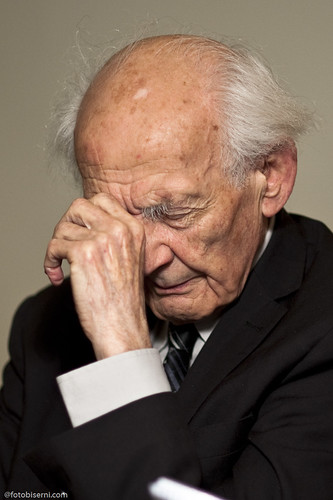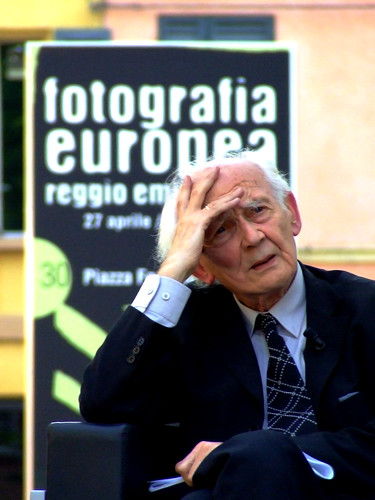
Lumea se reaseaza, Bucurestiul se rahateste de parca poate ignora istoria la nesfarsit. La reasezarea europeana, Romania contribuie fara valoare adaugata, ocupand acel loc din ce in ce mai stramt din care n-are cum sa iasa intreaga. N-o sa intru in detaliile decaderii, doar le suportam toti zi de zi. Introduc doar o recenzie a unei carti despre EUropa, a britanicului-polonez-european, Zygmunt Bauman, fost om a rusilor in Polonia, care le-a vazut pe toate si distilat intr-o serie remarcabila de lucrari. Nu va intrebati de ce 'telectualii, reflexiv de dreapta, din Romania nu vad aceste lucruri, ei sunt doar florile uscate ale sinecurilor neocoloniale.
Hobbes vs. Kant: "Say not the struggle naught availed"!
This is the second of Zygmunt Bauman's books I have read, and the first thing that needs be said is that you cannot skim-read Bauman. His writing demands the greatest attention to detail on the part of the reader, a care which will be hugely rewarded.
Summing up Bauman's messages inevitably trivialises their impact, but here goes.
Bauman's thesis is that Europe, having led the world into the Hobbesian "bellum omnium contra omnes" outside its borders "has now mellowed into an acceptance of the Kantian model of perpetual peace".
"But it cannot be allowed to dwell in that world, because it is, for the first time in its existence, overshadowed by a power greater than itself, and one which does not share the Kantian ideal, but dwells in the Hobbesian jungle, and trusts no other (nation)."
Europe has lost its way:
"Europe ... oscillates between the `ought' of a hospitable, user friendly planet determined to attain and secure a sustainable life for all its residents, and a planet of deepening disparities, tribal animosities and inter tribal fences, a planet ever less fit for human habitation."
"The ongoing institutional unification of Europe may ... prove to be ... a defensive move prompted by the impulse to defend Europe's `is' - its privileged life standards amidst worldwide deprivation against the `ought' of its challenging, uncomfortable yet imperative planetary responsibilities."
The original EU
" ... set out to work hard for thirty glorious years on the great social experiment of mitigating the unacceptable extremes of unbridled capitalism ... while averting the ... raw and uncouth communist version of social equity ... "
Bauman is a constant critic of globalisation, understanding as he does the union between US military might and the unchecked greed of corporate-capitalism:
"On a Fukuyama/Hobbesian planet, USA military might ... (the) police force of global capitalism can deliver blows at will and at random ... fearing little and hoping to emerge from the short, sharp encounter undamaged; ... In its triumphant seemingly unstoppable march through the planetary casino, capital confronts instead numerous competitors eager to play the same game ... One variety of adversaries that capital does not come across are the proponents of and realistic embodiments of an alternative form of life that would entail the abolition of the casino ... "
And this, Bauman believes, gives Europe its mission.
For Bauman, globalisation is about the creation of `wasted lives' - the migrants who we have seen clinging to the underneath of juggernauts, or packed into small boats - and all those in our own country who are victims of the fact that "full employment" is no longer the goal of good government, as it was before 1979.
At the same time, the welfare state turns into the security state, the war on terror merges with the war on `scroungers', migrants, the mentally ill, and teenagers who have been robbed of their future.
Government's role now revolves around "Standortkonkurrenz" - winning the struggle to: " ... seduce free-floating capital to flow in and to cajole it to resist the temptation to flow out."
To win this battle involves Governments adopting what Bauman calls the "pedlar/beggar" role of inducements, in which regulation, taxation, and welfare have been minimised in the interests of "flexibility". (And excess profit.)
Bauman sees it all with great clarity, and brings it into the sharpest focus.
It is nothing less than the end of The Enlightenment, in which the world was
" ... an object of critical inquiry and creative action ... "
In order to further the success of our new masters immigration is essential.
It depresses wage-rates, which also assists the Bank of England in controlling inflation. The indigenous population who complain about it can be dismissed as racists, so their problems do not have to be addressed, except via ASBOs (Anti Social Behavious Orders.)
Globalisation demands the end of solidarity and welfare: corporate-capital demands nothing less than full-on insecurity:
Conveniently for corporate-capital, along comes Al-Qaeda to attack what Blair calls "modernity" and to enable governments to switch people's attention away from globalisation and onto Muslims, who are just as much victims of globalisation as the rest of us.
And the return to "primordial loyalties" like race takes us further away from the only line of travel which might turn round this catastrophe: world government.
Rightly, since both the EU and the UN are examples of unaccountable, non-democratic bureaucracies which offer little prospect of the necessary supra-national control of trans-national corporations, it's is not easy to share Bauman's optimism that the EU could be turned into a body crusading for a democratic world government.
Back in the real world, President of the European Commission, Jose Manuel Barroso, writing in The (UK) Guardian (October 18, 2006), indicated the gap between Bauman`s hypothesis and existing reality:
"No nation state can meet the challenges of climate change, mass migration, global competition and terrorism on its own ... " the EU is " ... a uniquely effective instrument for helping the UK and other European countries to develop solutions to these new, cross-border challenges."
(Norway seems to manage quite well!)
How effective is it in practice?
1. Fishing. Faced with repeated calls for a complete ban on cod fishing over several years, the Commission is unable to do other that come up with a fudge. Expect cod to become extinct if the EU has its "uniquely effective" way in the matter.
At the same time the EU has sanctioned "factory" fishing off the coast of West Africa with the likely consequences described by Charles Glover in his book "The End of the Line".
2. Aviation's CO2 emissions. This problem is to be "solved" by airlines buying credits earned by other industries success in cutting their emissions. So the effect on total emissions would be to prevent them rising!
Fortunately, Bauman radiates a profound optimism which persuades this reader to prefer hope over pessimism.
Da click aici ca sa vezi totul! VREI SA-I INTALNESTI? cin s-aseamana s-aduna la facebook peromaneste





2 comentarii:
Opinia publica romaneasca (TV, presa, blogurile etc.) a fost framantata zilele acestea de trei “uriase” probleme: daca in teza sa de doctorat de acum 9 ani, Ponta a plagiat sau doar s-a inspirat din alt autor; daca la Consiliul european de la Bruxelles ar fi fost nimerit sa se duca presedintele sau primul ministru; daca fostul prim-ministru Ad. Nastase trebuie sau nu trimis la ocna, indiferent de starea sanatatii lui. S-au pronuntat si s-au scris cuvinte tari si manioase la adresa celor implicati mai sus si probabil ca scandalurile starnite nu vor fi usor abandonate de ziaristii dornici de victime si – daca se poate – de sange. Trebuie insa recunoscut ca toate temele amintite sunt expresii ale politicianismului, ca nici una dintre ele nu afecteaza interesele economice sau sociale majore ale populatiei. Se bate cat mai tare toba corectitudinii unor oameni politici, pentru a se evita desbaterea publica a unor chestiuni mai delicate, dar cu impact pentru viitor. Voi da un singur exemplu.
In zilele ce au precedat intrarea parlamentelor in vacanta, in toate tarile Uniunii Europene s-au discutat, cu argumente pro si contra, acceptarea infiintarii unei noi organizatii interguvernamentale cu titlul modest Mecanismul European de Stabilitate (MES). Scopul acestei institutii, cu o capacitate de creditare de 500 miliarde euro, ar fi, nici mai mult, nici mai putin, sa salveze bancile aflate in dificultate financiara, iar in primul rand pe cele din Italia si Spania. Totodata MES reprezinta un important pas in faurirea unui minister european al finantelor, ceeace va reduce si mai mult din suveranitatea tarilor membre. Romania nu face parte din cele 17 tari ale zonei euro, dar intreg sectorul nostru bancar este dominat de institutii financiare din aceste tari. Obiectivele declarate ale guvernului roman au fost, si continua sa fie, admiterea peste cativa ani a tarii printre tarile zonei euro, cu toate riscurile ce le comporta asta. Nu am intalnit insa, surfand pe internet, nicaieri o prezentare a implicatiilor MES pentru cetateanul (contribuabilul) roman, desi continutul documentului ce sta la baza lui a ridicat in alte tari numeroase obiectiuni si a facut obiectul destulor compromisuri. Se pare insa ca odata intrati in UE, suntem sortiti sa acceptam fara cracnire deciziile unor inalti functionari de la Bruxelles sau Luxemburg, copios platiti, dar care nu sunt supusi controlului sau sanctiunii electoratului. Data fiind situatia, este total nerevelanta disputa privind participarea pe viitor a sefului guvernului sau a presedintelui tarii la o sedinta sau alta a organizatiilor economice si/sau financiare. Hotararile ce se iau acolo sunt dinainte cunoscute si indiscutabile.
Cred ca e oportun sa inchei cele de mai sus cu un pasaj din cartea lui Jacques Attali, fost consilier timp de aproape 20 de ani al presedintelui Frantei, Francois Mitterrand, si intitulata “La crise, et apres?” – Ed. Fayard : „ O ideologie care serveste la mentinerea puterii unui grup, nu rezista decat daca are capacitatea de a explica oamenilor sensul vietii lor, de a da ratiune muncii lor. Astazi ideologiei liberale ii este greu sa convinga lumea ca capitalismul mondial este in serviciul oamenilor, ca e corect sa se plateasca bancherilor bonusuri de 10 miliarde si ca democratia se ingrijeste si de interesele paturilor sarace si a viitoarelor generatii. Aceasta criza este totodata ocazia de a intelege cum un grup mic de oameni, fara a produce noi bunuri, acapareaza in deplina legalitate si lipsiti de orice control, o parte esentiala din valoarea creata de societate. Si cum acest grup, dupa ce a jefuit tot ce se putea, constrange sa i se plateasca uriase prime de catre muncitorii, contribuabilii, salariatii, consumatorii, patronii etc. din intreaga lume, fortand statele sa gaseasca pentru ei rapid, sume de mii de ori mai mari decat cele pe care aceleasi guverne refuza zilnic sa le dea celor mai sarace tari si milioanelor de infometati de pe glob. Totul se petrece insa in mod “cinstit” si neviolent. Iar in ochii multora, asta constitue principalul motiv de revolta: daca tot ce se petrece e legal, atunci insusi sistemul ce permite o asemenea aberatie nu are justificare de a fi!”
Trimiteți un comentariu